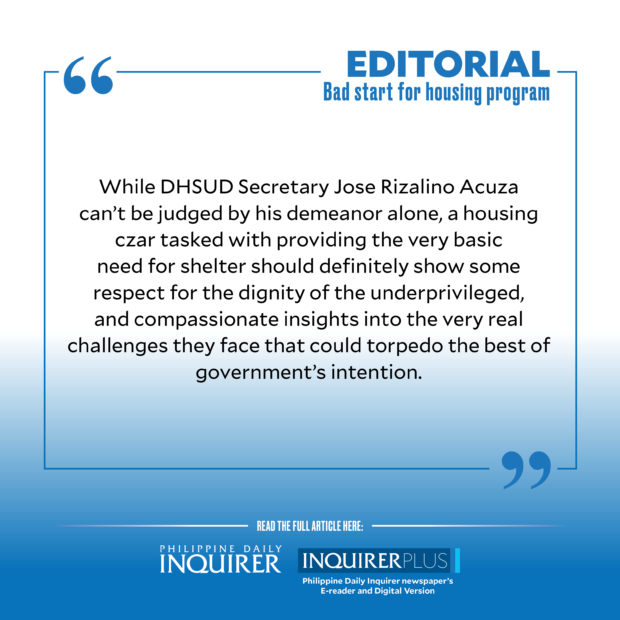
During a budget hearing of the Department of Human Settlements and Urban Development (DHSUD) last week, House members pointed out that the housing program would require a staggering amount of government subsidy, but would still be beyond the reach of minimum wage earners.Under Executive Order No. 34 issued in July, Mr. Marcos identified the Pambansang Pabahay Para sa Pilipino Program (4PH) as a flagship program meant to fulfill the constitutional mandate to provide decent and affordable housing to underprivileged and homeless citizens. With a housing backlog of 6.8 million as of 2022, the Marcos administration said it would build one million houses a year, or 6 million by the end of the President’s term.
But the plan apparently looks good only on paper. For 2024, the DHSUD has proposed a P5.40 billion budget, of which P1.5 billion will cover the government’s share in interest payments for 50,000 housing units for next year.
The annual subsidy would be too costly for the government, noted Marikina City Rep. Stella Luz Quimbo, vice chair of the House appropriations committee. “That P1.5 billion is hefty; it’s for 50,000 houses. And if you add 50,000 houses every year, you keep on adding to interest subsidies,” she said. Actually, clarified Housing Undersecretary Roberto Juanchito Dispo, the interest subsidy for one million housing units is estimated at P36 billion a year.
Aside from the issue of sustainability raised in the hearing, the fundamental issue in the 4PH plan is affordability for its beneficiaries. Under the 4PH manual, the government plans to build in-city multistory buildings with units ranging from P1.12 million for a 24 square meters home, and P1.63 million for 27 sq m. According to DHSUD Secretary Jose Rizalino Acuzar, the P3,500 to P4,500 monthly amortization will further be trimmed to P2,000, with the government subsidizing a big part of the interest rate.
But even with subsidy, the housing units are still too expensive for minimum wage earners, said House Deputy Minority Leader Rep. France Castro who also described the 1 million housing target as “wishful thinking.’’ She added:
“It’s a far-fetched dream for the poor to afford P3,500 monthly payments if they are making only P610 a day or minimum wage. The poor cannot afford your proposal.”
It was not his department’s job to raise the minimum wage, Acuzar said. “Don’t we have the Department of Labor and Employment [for that?] The role of the Cabinet is to raise the minimum wage and provide jobs. Ours … is to provide housing. Our program is that you’ll have a house if you have work. Minimum wage earners are guaranteed to get their own houses,’’ Acuzar said.
In Acuzar’s view, those who can’t afford the monthly amortization are just lazy.
“Iyon pong hindi nagtatrabaho, malamang hindi magkakabahay. Paano iyan mangyayari kung ikaw ay tamad at siya ay masipag? Minsan kailangang harapin and katotohanan na sila ay hindi nagsisipag. (Those who won’t work will probably not have homes. It won’t happen if you’re lazy),” he added.
Countering Acuzar’s rather hasty generalization, Gabriela party list Rep. Arlene Brosas pointed out that due to harsh socioeconomic conditions, the poor could hardly make ends meet.
“This 4PH [housing] program will not really address the needs of the poorest of the poor. And that is not [because of their] laziness. The last significant wage increase was in 1989; the [recent] increase was very small,’’ Brosas said, referring to the P40 a day wage hike in Metro Manila in the face of the inflated prices of basic commodities and services.
At one point, Acuzar said that in previous housing programs, the poor were merely dumped in far-flung resettlement areas. “Noong unang programa, ang mahihirap tinatapon natin sa off-city [resettlement] … ’’ he started to say but was cut off and had to apologize for his callous language.
Given the housing czar’s harsh words that reflect a disdain for the program’s intended beneficiaries and lack of basic understanding about their circumstances, money may not be the only problem that will hobble the Marcos administration’s flagship program.
While Acuzar can’t be judged by his demeanor alone, a housing czar tasked with providing the very basic need for shelter should definitely show some respect for the dignity of the underprivileged, and compassionate insights into the very real challenges they face that could torpedo the best of government’s intention.
Acuzar might have been used to the profit-oriented mindset of a property developer that he was before his government post, but his taxpayer-paid job now is to help the less fortunate get a home they can call their own. Apart from recalibrating its unrealistic targets, the DHSUD needs to have genuine concern and empathy for the poor which its present leader so sorely lacks.